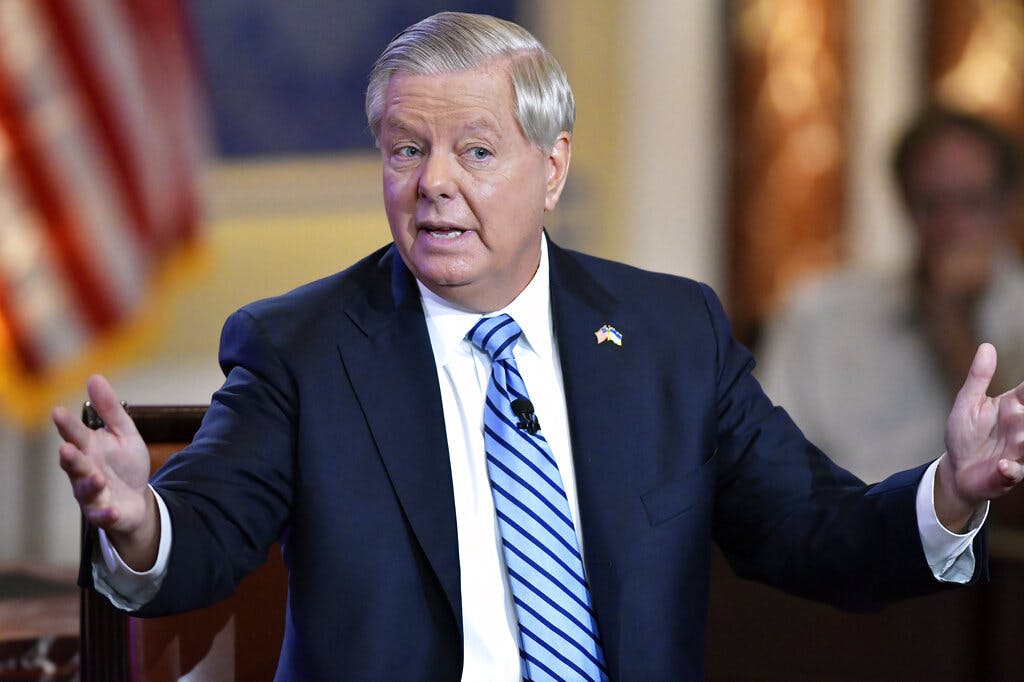Lindsey Graham Cavils at Israel’s Talk With Top Russian
Pro-Israel senator is ‘unnerved’ by a dialog between Moscow and Jerusalem.

Lindsey Graham is troubled — or “unnerved,” as he phrased it — by a dialogue between Moscow and Jerusalem. On Tuesday the Israeli foreign minister, Eli Cohen, spoke by phone with his Russian counterpart, Sergey Lavrov. He reportedly did so at the behest of Secretary Blinken, but what seemed to roil the Republican senator of South Carolina is that such a conversation should take place at all.
In a tweet, Mr. Graham said, “I hope Mr. Cohen understands that when he speaks to Russia’s Lavrov, he’s speaking to a representative of a war criminal regime that commits war crimes on an industrial scale every day.” He added he was glad to see Israel’s new foreign minister support continued humanitarian aid to Ukraine, but in a subsequent tweet said that “the idea that Israel should speak less about Russia’s criminal invasion of Ukraine is a bit unnerving.”
In the same thread, which cannot be seen as anything other than criticism of the Israeli decision to speak with Mr. Lavrov against the backdrop of the ongoing Russian invasion of Ukraine, Mr. Graham tweeted, “to stay quiet about Russia’s criminal behavior will not age well.”
Following his phone call with the Russian foreign minister, Mr. Cohen requested a call with the Ukrainian foreign minister, Dmytro Kuleba. According to the Times of Israel, a Ukrainian official “indicated that if Cohen were to hold a conversation with Lavrov first, Kuleba might refuse any call with Cohen in the near future.”
That kind of reaction would dovetail with Mr. Graham’s insinuation of an Israeli tilt toward Moscow in the 10-month-old Russia-Ukraine war, something which an Israeli diplomatic official dismisses as “confusion.”
What exactly Messrs. Cohen and Lavrov discussed — and why the American secretary of state, Mr. Blinken, wanted them to speak — was not disclosed. On Wednesday, meanwhile, separate scheduled phone calls between President Erdogan and Presidents Zelensky and Putin generated no apparent consternation in either Washington or Kyiv.
That raises some questions, one of which is pointedly not whether Jerusalem is shifting its stance vis-à-vis the Kremlin — there is no indication to support any such claim — but rather whether Israel being singled out, and if so why?
Israel has sent considerable humanitarian aid to Ukraine but has tiptoed around the issue of requests to provide defensive weaponry. Jerusalem has plenty of reasons to walk a careful line. The country’s alleged strikes against Hezbollah weapons depots in Syria, where Russia has a military footprint, are predicated on back-channel strategic cooperation with Moscow. Israel is in no position to ship out its Iron Dome rocket defense units to third-party countries, especially with Hamas in Gaza and heavily armed Hezbollah entrenched in Lebanon.
There are other issues. As a recent article in the magazine Hungarian Conservative put it, “Ukraine was not a good-news story before the invasion, nor a democratic example to be afraid of, and was not on the verge of success.” That is an oblique reference to the corruption that both Washington and the EU periodically call out despite the months of war.

